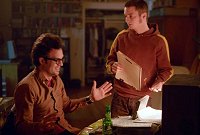 The Corners of My Mind
The Corners of My Mind At age 45 Charlie Kaufman has been called the most powerful screenwriter in Hollywood. His films are made as written, without studio interference -- big stars line up to take pay-cuts to appear in them. And despite the fact that one of his films (Adaptation) featured a character called Charlie Kaufman in the lead role, heís so defiantly unfamous that most people have no idea what he looks like. Well, heís a small, self-contained redhead with a wry sense of humour and a very quick mind. And he seems almost disarmingly open and honest when you talk to him.
At age 45 Charlie Kaufman has been called the most powerful screenwriter in Hollywood. His films are made as written, without studio interference -- big stars line up to take pay-cuts to appear in them. And despite the fact that one of his films (Adaptation) featured a character called Charlie Kaufman in the lead role, heís so defiantly unfamous that most people have no idea what he looks like. Well, heís a small, self-contained redhead with a wry sense of humour and a very quick mind. And he seems almost disarmingly open and honest when you talk to him.While in London for the premiere of Eternal Sunshine of the Spotless Mind, he ran into John Malkovich for the first time since they worked together on Being John Malkovich -- and it was like family members reuniting!
 For French director Michel Gondry, Eternal Sunshine is a second collaboration with Kaufman after Human Nature. Gondryís style of never turning the camera off is legendary amongst actors as well as musicians he has worked with -- including Bjork, Rolling Stones, Foo Fighters, Radiohead and Kylie.
For French director Michel Gondry, Eternal Sunshine is a second collaboration with Kaufman after Human Nature. Gondryís style of never turning the camera off is legendary amongst actors as well as musicians he has worked with -- including Bjork, Rolling Stones, Foo Fighters, Radiohead and Kylie.
We talked to them when they were in London promoting the DVD release of Eternal Sunshine. Until about halfway through this film, you really donít know what itís about...
Charlie Kaufman: Yes, itís not that you miss anything the first time, itís that you think itís something that itís not. Which is what Joel (Jim Carrey) and Clementine (Kate Winslet) are going through. It was important for me to keep the audience in this movie, exactly where the characters were.
Michel Gondry: Charlie and I talked about how we would portray memories and it was a very important idea that we had to convey; that the memory would physically decay. I wanted the audience to feel the damage of the memory loss and I was interested in showing it is not a continuity of the moment, but it is like a map that physically connects all the memories. But this idea only works if you do it in a material way. If it was digital; it would not work. There have been terrible experiences with dreams in films that are depicted digitally. Two years after they are done they age very quickly and are dated and not special anymore. When they are real they feel more visceral. I was thinking about when they do movies with ghosts and how they do optical effects and everything gets blurry.
Most of your screenplays are about love in some form. Whatís your inspiration?
Kaufman: Myself. My life. My interests. I have an interest in that. I guess probably everybody does.
Mark Ruffalo says you also analyse people a lot -- that youíre a real observer.
Kaufman: I think Mark is giving me credit where itís not due. Itís just because Iím quiet that he thinks Iím doing something.
How did you choose the title?
Kaufman: I was looking for stuff for Mary (Kirsten Dunst), who collects quotes. I found this quote, and serendipitously, itís from a poem called Eloise to Abelard by Alexander Pope, and I have a kind of love for Eloise. I read her letters to Abelard. I find them rather exceptionally moving. I actually used those characters in Being John Malkovich too. And I liked that the title was hard to remember. I thought it was very pretty, but very cumbersome, and nobody could remember it. It was kind of counterintuitive.
How did you collaborate with Charlie Kaufman?
Gondry: We share a lot of opinions about how we see life through reality and not movies. We are overall pessimistic and yet we both find humour through the pessimism. I like geometrical patterns, and his stories are very geometrical, I think, so it is a great collaboration. He writes on his own but in this case I gave him some ideas and we talked a lot about the script and Iíd find things in the script that I told him about my life. And he left me alone for the shooting and for the editing and then he was here a lot to help. He likes to be part of the process from beginning to end.
How did you meet?
Gondry: I met him through Spike Jonze, because I had another project that had some similarities but he didnít like it, and I came back a second time with this idea and he liked it. I remember we talked about how the character could take Clementine and put her in another memory that wasnít associated with her so that when he woke up from having his memory erased, he would be able to find her in another memory -- and he got very excited about that idea as the basis of the whole story.
Did you have any problem getting this film made the way you wanted?
Kaufman: I donít think we had really great difficulties. I think there was always a discussion about the level of confusion that should be allowed in the audienceís mind. You know how confused people can be before they leave the cinema and want to figure things out? Michel and I really, really wanted to challenge people, because thatís what we like in movies. We watch a movie and we are excited by the prospect of figuring out things for ourselves. Hollywood studios have a tendency to sort of think in other terms, so that was a discussion, but we ended up being able to do it the way we wanted to do it.



CHARLIE KAUFMAN FILMOGRAPHY...




Human Nature (2001)

MICHEL GONDRY FILMOGRAPHY...
Master of Space and Time (2006)
The Science of Sleep (2004)

Human Nature (2001)
